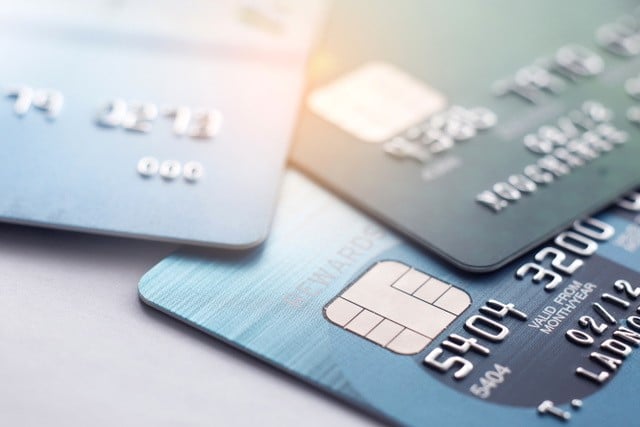When used responsibly, credit cards can be a great way to build credit or start credit history. But how many credit cards are too many, or too few? The truth is, there is no magic number for how many credit cards you should have. It’s how you use them that really matters!
How Many Credit Cards Are Too Many/Too Few?
The average American holds around three credit cards. But keep in mind that everyone’s financial situation is different, so having three credit cards does not guarantee you financial success.
To determine the ideal number of credit cards for you, you need to understand your financial situation, goals and have knowledge of how to manage money. For example, look at your spending habits and ability to pay bills on time. If you find your credit utilization (the amount of credit line you use each month) is often high, having multiple credit cards may be beneficial. If you struggle with keeping track of monthly payments, having fewer credit cards may be the better option for you.
Why Is It Good to Have Multiple Credit Cards?
There are benefits to having multiple credit cards that may help you on your financial journey.
More Purchasing Power
If you have only one credit card, you might find yourself easily reaching your credit limit. Having multiple credit cards could increase your purchasing power by giving you more total credit line to utilize.
Having more credit lines available can help keep your credit utilization lower, which may improve your credit score. It is recommended to keep your credit utilization under 30% of your total credit line. Keep in mind that while having more credit lines can be an advantage, it should be used responsibly.
Reward Opportunities
Credit cards often have reward opportunities you may be able to capitalize on. Choose which credit card and its respective rewards program that would be most beneficial to you, whether that’s travel points or cashback. Be aware that applying for credit cards solely to earn any offered bonuses and then immediately closing the cards is not advised and could hurt your credit score.
Why Is It Bad to Have Multiple Credit Cards?
Having multiple credit cards also has downsides to consider.
Credit Card Management
Owning multiple credit cards means managing multiple billing cycles, interest rates, fees and credit limits, which could get overwhelming. If you are not well organized, having too many credit cards could be more of a burden than a financial advantage.
Lending Risk
Having a high number of credit cards might make you seem like a potential liability to some lenders.
Fees & Interest Charges
Fees and interest charges can be difficult to manage. Premium cards may have annual membership fees you must account for, and — depending on the amount you pay off each month — interest charges could become unmanageable if not handled correctly.
How Does Having Multiple Credit Cards Impact Credit Score?
Credit cards are a credit tool and therefore can impact your credit score. Whether that impact is good or bad depends on how you use them.
Credit Utilization Ratio
As previously mentioned, multiple credit cards may be beneficial for your credit score because they allow you to have lower total credit utilization. Credit utilization accounts for 20% of your VantageScore, so keeping this in check could bolster your credit score. However, if you consistently use more than 30% of each credit card limit you have, your credit score could take a hit.
Payment History
Having multiple credit cards means managing multiple due dates. Payment history accounts for 41% of your VantageScore, so paying on time is far more important than how many credit cards you have. So, be sure to pay all your credit card balances on time to avoid dings to your credit score.
Credit Age
The age of your credit accounts factors into your credit score. The longer you’ve had a credit account, the better. But because credit scores take the average age of all your accounts, this is where multiple credit cards may come in handy.
Tips for Managing Multiple Credit Cards
Having multiple credit cards requires some management skills but it doesn’t have to be difficult.
Give the Card a Purpose
One way to keep your credit cards manageable is to give each card a purpose. Your airline rewards card may be your main card for booking flights, while your everyday cashback card is for restaurants or gas. Other perks, such as travel insurance, may influence where you use certain credit cards. Write a cheat sheet for each card’s purpose to stay organized.
Choose Due Dates that Work for You
Owning multiple credit cards often means multiple due dates, but did you know you can request specific payment dates for each card? Some card issuers allow you to do this online while others require a phone call. Request payment dates that work best for your schedule to avoid a missed payment. This can make managing multiple credit cards much easier!
How Often Should You Apply for a Credit Card?
When you are building up your credit profile, it is important to consider how often you are applying for new credit cards—like waiting around six months before applying for another credit card. This waiting period may increase your chances of getting approved. If you are applying for credit cards quicker than six months apart, issuers may see you as a risk and not approve your application.
There are times when you want to spread out your credit card applications even further. When you’re buying a home or making a big purchase, applying for multiple credit cards in a small timeframe may knock points off your credit score. This can make completing that big purchase a little tougher or earn you a higher interest rate.
Which Credit Card Should I Apply for?
There are plenty of credit cards out there that can help you achieve your financial goal, but which one may be right for you? Typically, credit cards fall into one of these three categories:
- Rewards Credit Cards: Rewards credit cards typically give you cashback, miles or points when you make certain purchases. There are various kinds of rewards cards that serve different purposes.
- Low-Interest & Balance Transfer Credit Cards: These credit cards are designed for those who do not or cannot pay their credit card balance in full each month. This can make the interest accrual a little lower than it would be with a rewards credit card.
- Credit-Building Cards: Credit-building cards are intended just as they are named—building credit! Student credit cards, for example, are to help those who have no credit history start to build it.
There is much to consider when thinking about opening multiple credit cards. While there isn’t a magic number, the number of credit cards that is best for you depends on your financial situation, goals and how you intend to use them.
Centris Federal Credit Union offers an array of credit card options* to best fit your financial needs. When you’re ready to start building your credit portfolio, stop by a local Centris branch, call (403) 334-7000 or apply for a Centris credit card online.
*Subject to Credit Approval. Terms and Conditions Apply. Federally Insured by NCUA.




